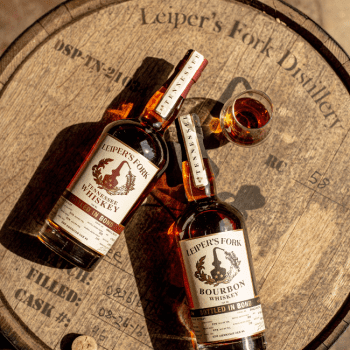Leiper’s Fork: a different kind of Tennessee whiskey
By Rupert HohwielerHow is Leiper’s Fork resurrecting pre-Prohibition-style whiskey making? At a masterclass in London, the distillery’s founder and owner, Lee Kennedy, explained.

The family-owned small batch distillery takes its name from the village of Leiper’s Town, south of Nashville in Tennessee – a tribute to its standing as the town’s first legal distillery in more than 100 years.
Favouring a low-impact and low-quantity approach to its whiskey making, the distillery fills around 500 casks a year – and will upgrade its stills to double the capacity in the next year and half. It will also launch two new expressions next year, one a Rye Bottled in Bond, and the other a eight-year-old single barrel whisky that will be exclusive to the UK. Leiper’s core range already includes a Tennessee whiskey, a Bourbon and a rye.
In October, The Spirits Business, members of the trade, whiskey enthusiasts and curious newcomers to the category gathered at Brunswick House in London for a special preview of the new whiskeys, alongside the distillery’s existing range. Leiper’s Fork founder, owner and master distiller Lee Kennedy ventured to the US especially to lead the session.
“There’s a direct flight from London to Nashville now, so we would love to have you all over and visit too,” Kennedy enthused to the crowd, shrugging off any signs of jet lag.
Before diving into the tasting, Kennedy spoke about the distillery’s whiskey history and its significance in Tennessee. “Whiskey has a really long tradition in Tennessee, much in the same way it does in Kentucky,” he said to the crowd. “In 1896 Tennessee had 322 distilleries and there’s 95 counties here, so it’s very pervasive as part of the cultural fabric [of the region].”
During Prohibition, in 1910, Tennessee enacted its own in-state Prohibition, which would wipe out nearly the entire industry in the state, as only three counties allowed legal whiskey distilling to take place. This law would finally change in 2009, where Kennedy would play a starring role: “In 2009, I went to our local government in Williamson County and asked them to change the law. It took us three years to do that, but we did it and we filled our first barrel in April 2016,” he recalled.
‘Pre-Prohibition styles of whiskey’
Now, having helped remove those long-imposed restrictions, Kennedy’s next move is to reawaken the old whiskey traditions and techniques that he feels have been lost over the years. This is what shapes the process at Leiper’s Fork. “We make what we call ‘pre-Prohibition styles of whiskey’,” he said.
Adhering to this style, Leiper’s Fork makes whiskeys that use a sweet mash over sour, a low-barrel entry proof, and a pot still distillation. The distillery also makes whiskeys under strict guidelines from the Bottled in Bond Act of 1897, which Kennedy explained in detail during the session.

“It’s the honest approach,” he said. “If you look at our label, we have so much information on there that we don’t have to put on there. But for us, transparency is a badge of honour.”
Returning back to pre-Prohibition styles, Kennedy delved more into the differences between sweet mash and sour mash.
“Sour mash is also used in single malt Scotch production,” he said. “So it was more prevalent before American prohibition.
“We’re not taking any of that acidic backset that is our spent grains from the distilling process and we’re not adding that to our mash water. We’re starting with a very fresh batch of mashed water when we start our mash-cooking process.
“Ultimately, what that does is it gives us a higher pH all the way through the process of making our whiskey through to maturation. Alkalinity is associated with softness, while your acidity is with sharpness, so I hope you find these whiskeys very soft.”
‘Terroir whiskey’
Leiper’s Fork handles all areas of the whiskey process, controlling the grain selection, mashing, fermentation, distillation, barrel ageing and bottling. Kennedy also touched on how important sustainability was to the distillery.
“We use all locally grown, non-GMO grains and we farm 50% of our own corn that goes into our whiskeys at our family farm,” he explained. “The rest of our grains, including our barley and our rye – which a lot of farmers in the states are shocked that we grow in middle Tennessee – all that comes within a 10-mile radius of the distillery.”
“We’ve all heard of the terroir aspect of wines; we’re trying to create as much of a terroir whiskey as we can,” he added.
“For us on everything, we’re trying to keep the integrity of the product first and foremost in mind. We’re trying to bring back the lost art of small batch whiskey production that was prevalent in Tennessee from its founding.”
Click the video below to watch highlights from the Leiper’s Fork masterclass with Kennedy.
Related news
